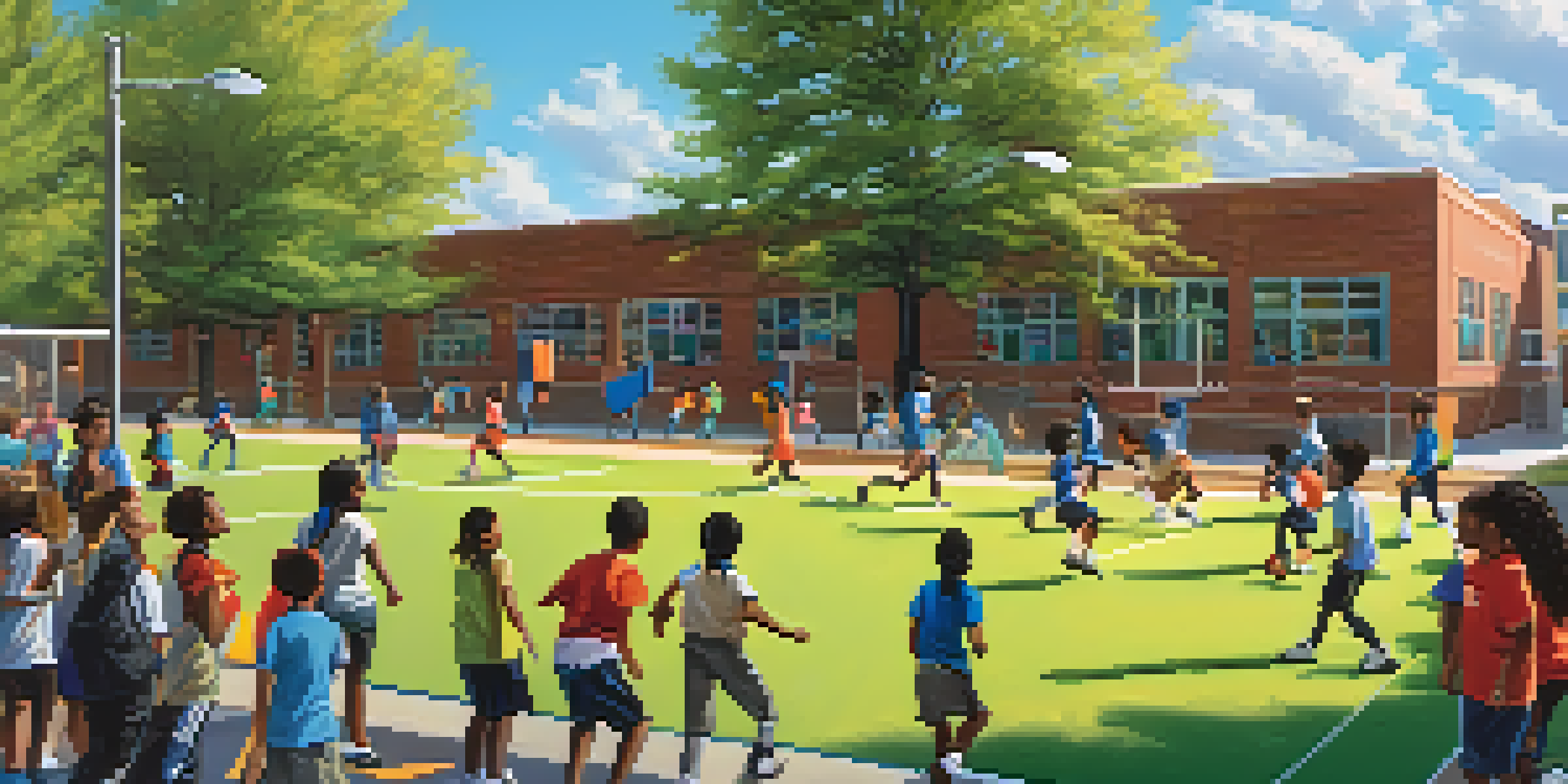Extracurricular Activities in Jersey City Schools: Benefits Explored

Introduction to Extracurricular Activities in Jersey City Schools
Extracurricular activities are an essential part of the educational experience in Jersey City schools. These programs range from sports and arts to clubs and community service, offering students opportunities to explore their interests outside the classroom. In Jersey City, schools emphasize these activities, recognizing their role in fostering well-rounded individuals.
Extracurricular activities are the perfect way for students to explore their passions and develop essential life skills outside of the classroom.
Participating in extracurriculars helps students develop critical life skills, such as teamwork, leadership, and time management. These skills are invaluable not only in school but also in future careers and personal relationships. As students engage in these activities, they learn how to balance academics with their passions.
Moreover, these programs encourage a sense of belonging and community among students. In a diverse city like Jersey City, extracurricular activities can bridge cultural gaps, allowing students to connect with peers from different backgrounds. This community aspect enriches the overall educational experience.
Academic Improvement Linked to Extracurricular Participation
Research consistently shows that students involved in extracurricular activities tend to perform better academically. The skills gained through these activities, such as discipline and focus, often translate into improved study habits and classroom performance. Engaging in sports or clubs can motivate students to maintain their grades to participate.

For instance, a student who plays soccer might prioritize their homework to ensure they can join their team. This motivation can lead to better time management and organizational skills, essential elements for academic success. Furthermore, involvement in extracurriculars can make school more enjoyable, encouraging students to attend classes regularly.
Extracurriculars Boost Academics
Participation in extracurricular activities is linked to improved academic performance and higher student engagement.
In Jersey City, schools have observed that students who are active in extracurriculars often have higher GPAs and lower dropout rates. This correlation highlights the importance of supporting these programs, as they not only enhance the school experience but also contribute to long-term academic achievements.
Social Skills Development Through Extracurricular Activities
Extracurricular activities provide a unique platform for students to develop social skills. By participating in teams, clubs, or group projects, students learn how to communicate effectively, resolve conflicts, and collaborate with others. These interactions are crucial for building friendships and creating a supportive network during school years.
The more involved students are in extracurricular activities, the more successful they will be in their academic and personal lives.
For example, a student involved in a debate club learns how to articulate their thoughts and engage in constructive discussions. This experience boosts their confidence and equips them with skills that are essential in both personal and professional settings. As they navigate different social situations, they become more adept at understanding diverse perspectives.
In Jersey City, where cultural diversity is a hallmark, these social skills are particularly valuable. Students gain an appreciation for various backgrounds and viewpoints, fostering empathy and understanding. This cultural awareness not only enriches their school experience but also prepares them for a more interconnected world.
Building Leadership Qualities in Young Students
Extracurricular activities are a breeding ground for future leaders. Many programs offer students the chance to take on leadership roles, whether as a team captain, club president, or project leader. These positions challenge students to step out of their comfort zones and develop their leadership styles.
Taking responsibility for others, organizing events, and making decisions helps cultivate essential leadership qualities such as accountability and resilience. For instance, a student leading a community service project learns how to motivate their peers while managing the logistics of the initiative. These experiences can shape their approach to leadership in adulthood.
Social Skills and Community Impact
These activities foster essential social skills and promote community engagement, helping students connect with diverse backgrounds.
In Jersey City, schools encourage students to embrace these leadership opportunities, recognizing their potential impact on the broader community. As students hone their abilities to lead, they not only prepare for future roles but also inspire their peers to engage and contribute positively to society.
Emotional Well-Being and Extracurricular Activities
Engaging in extracurricular activities significantly contributes to students' emotional well-being. These programs provide a healthy outlet for stress and a break from the academic pressures of school. Through creative arts, sports, or clubs, students can express themselves, which is crucial for mental health.
For instance, a student involved in a theater production might find joy and relief in acting, helping to alleviate anxiety and enhance their mood. Such activities can foster a sense of accomplishment and boost self-esteem, as students witness their talents and abilities grow over time. This emotional support is vital during the often tumultuous school years.
In Jersey City, schools are increasingly aware of the mental health benefits tied to extracurricular participation. By encouraging students to engage in these activities, schools aim to create a balanced environment where students can thrive emotionally as well as academically.
Community Engagement and Extracurricular Activities
Extracurricular activities often extend beyond school walls, promoting community engagement. Many programs involve service projects or collaborations with local organizations, allowing students to contribute positively to their neighborhoods. This involvement helps students develop a sense of responsibility and connection to their community.
For example, a local environmental club might organize a cleanup event in a nearby park, fostering teamwork while making a tangible impact. Through these initiatives, students not only learn about social issues but also gain firsthand experience in making a difference. This sense of purpose can be incredibly rewarding.
Leadership Development Opportunities
Extracurriculars provide students with opportunities to develop leadership qualities and take on responsibilities that shape their future.
In Jersey City, schools emphasize community involvement as part of their extracurricular offerings. By integrating service-learning projects, students can develop civic responsibility and an understanding of their role in society, encouraging them to be active, informed citizens.
Diverse Opportunities for All Students in Jersey City
One of the remarkable aspects of extracurricular activities in Jersey City schools is the variety of options available. From sports teams and music programs to robotics clubs and cultural organizations, there is something for everyone. This diversity allows students to explore different interests and find their passions.
For instance, a student who may not excel in traditional academics might shine in a creative arts program, discovering talents they never knew they had. This inclusivity is crucial in fostering a sense of belonging among all students, regardless of their backgrounds or abilities. It encourages exploration and self-discovery.

Jersey City schools actively promote these diverse opportunities, ensuring that every student has the chance to engage in activities that resonate with them. By providing a wide range of extracurriculars, schools empower students to pursue their interests, ultimately leading to a more enriched educational experience.
Conclusion: The Lasting Impact of Extracurricular Activities
In conclusion, extracurricular activities play a vital role in the holistic development of students in Jersey City schools. They not only enhance academic performance but also cultivate social skills, leadership qualities, and emotional well-being. These programs foster a sense of community and provide diverse opportunities for all students.
As students engage in various activities, they learn invaluable life skills that extend far beyond the classroom. The friendships formed and experiences gained through these extracurriculars contribute to a positive school experience and prepare students for future challenges.
Ultimately, supporting and nurturing extracurricular programs in Jersey City schools is essential. By recognizing their significance, educators and communities can help shape well-rounded individuals who are not only academically proficient but also socially responsible and emotionally resilient.